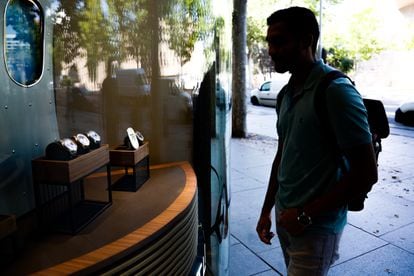In the summer months, as people opt for more revealing clothing, jewelry is exposed.
On the street corners of Paris, Barcelona, London, Madrid, Rome, there are thieves waiting, alone or in groups, on foot or on motorcycles.
You may not even notice when they remove your chain or your watch – or, if they're unskilled, you may end up lying on the ground, injured or worse.
Jewelry theft has been “democratized” in Europe: once the work of careful experts, it is now being carried out by common criminals.
Last year, on the island of Ibiza, these thugs broke a record: they stole a watch worth €1.2 million.
A private security company managed to recover it.
Barcelona.
The images spread through social media like wildfire: a man was walking with his family through the Old City when a thief violently accosted him and snatched his watch from him.
He claimed that it was a Hublot worth €800,000, although the police verified that it was actually worth about €43,000.
Young thieves are generally recruited by international networks, who place the stolen watches for sale on the Asian market.
The watch-snatchers get a good chunk of cash, though it is meager compared to the sum that the final sellers make.
Police sources explain that, a decade ago, most watch thefts were committed by Italian or South American experts, usually via motorcycle.
Now, the crime is more rampant: watches account for more than 4% of violent robberies in Barcelona, in the region of Catalonia in northeastern Spain.
To combat it, the Catalan police have created a unit that examines the criminal structures behind each hit, to better recover property and achieve court convictions.
Intelligence has allowed the cops to trace the life of these luxury watches.
Most are stolen in Europe.
Then, the recruiters hire people with no criminal record with a single mission: to travel to other cities with the stolen property on their wrist.
Majorca
.
In August 2019, the chief prosecutor of Spain's Balearic Islands, Bartomeu Barceló, was walking near La Rambla when a young man pushed him from behind, knocking him off balance.
His gold watch was snatched from his wrist.
The assailant fled with another young man who was waiting for him on a motorcycle.
Hours later, they were arrested, about to catch a plane at Palma airport.
According to Chief Inspector Eduardo Pérez, head of the National Police Robbery Unit, the two belonged to a gang of Neapolitan origin, which has a monopoly on the theft of luxury watches in the Spanish archipelago.
Wristwatches worth over €30,000 are stolen – with minimal violence – and taken by plane to Barcelona or Rome, destined for Naples.
“Until a few years ago, these were treated as isolated events… but now a more organized approach is being detected,” says Pérez.
The gang operates in luxury tourism areas, such as Portals Nous in Calvià or Jaime III in Palma.
In 90% of cases, the victims are foreigners.
The complaints accumulate between May and October.
One of the most notorious robberies was that of a €1.2 million watch from a young Azerbaijani tourist last June in Ibiza.
It was a 50-03 McLaren F1 model of the Richard Mille brand, one of just 75 units that had been manufactured throughout the world.
A private security company managed to recover it.
The Neapolitan gangs now recruit common thieves.
Most are young men of North African origin, with no connections to each other, who sometimes resort to violence.
In the winter, they go to the Canary Islands to commit crimes, taking advantage of the good weather and tourism, according to the National Police.
“In these cases, the watches have much less value,” the Chief Inspector affirms.
He notes that, in the case of common robberies, the police wait for the complaint before acting.
In the case of the specialized Neapolitans, however, they make use of intelligence work.
“Last time we managed to arrest the perpetrators before the theft had been reported.
We stopped them at the airport about to board the plane,” he explains.
Madrid.
In February, a man went to the upscale Salamanca district police station to report the theft of a watch worth €40,000.
He explained that while he was inside his car at a traffic light, a motorcycle pulled up next to him and the driver grabbed his arm from him until he tore off his watch.
In less than a month, the police caught the thief red-handed: he was arrested after colliding with a scooter on the sidewalk, after snatching an €80,000 Patek watch from a man he had pulled from his vehicle.
A man looks at a watch display on Madrid's upscale Serrano Street.
Aitor Sol
Four operations have ended in recent months with eight details – seven of whom are still in prison – for stealing watches valued at almost half-a-million euros.
The wealthy districts of Salamanca, Chamartín and Chamberí were their hunting grounds.
The thieves did not hesitate to use violence, leaving woulds on the wrists or the heads of their victims.
“These robberies began to be detected less than a year ago.
In these neighborhoods, this is unusual, but I am very afraid that it will begin to be a constant thing, "says a police source who works in affluent parts of the Spanish capital.
Some of the detainees lured victims by getting them drunk.
A gang of Venezuelans preferred to search the sidewalk cafes of wealthy areas, observe the wrists on the armrests and attack the victim with the most ostentatious watch.
They hit them on the head with the butts of firearms.
Paris.
In the world capital of luxury, street theft of watches began to skyrocket a decade ago and, in recent years, “has been democratized,” as explained by the local newspaper
Le Parisien
, citing police sources.
At first,
Le Parisien
recounts, there were gangs of Neapolitans or Algerians, professional thieves with the ability to steal watches with minimal violence and a thorough knowledge of the market.
But now, a new generation has joined them, made up of young people from the suburbs, petty criminals with superficial knowledge of the sector.
“The attacks can be extremely violent,” Commissioner Julien Herbaut, head of territorial security in the French capital, told the aforementioned newspaper in May.
These rougher thieves target Rolexes worth about €15,000, which they resell immediately, according to the French press.
“They know two or three models, no more,” Herbaut told
Le Parisien
.
Luxury watch thefts in Paris have increased by 31% since the beginning of 2022, according to figures published by the
Journal du dimanche
.
On May 22, the BFMTV channel recorded up to three robberies in less than four hours in various Parisian neighborhoods: a Rolex worth €25,000, another worth €8,000 and a Richard Mille worth €400,000.
Times have changed, as have methods.
The Neapolitans, as Herbaut explained, tend to detect a luxury car, hit the rear-view mirror from a motorcycle and, when the driver puts out their arm to reposition it, snatch the watch from a second motorcycle.
The Algerian method is to approach the victim in a group, joke with them and take the opportunity to steal their watch without the owner noticing.
The method of the new generation, younger and more brash, is to simply grab the victim from behind by the neck;
an accomplice will then rip off the watch.
London.
After Jack The Ripper, there have been many more rippers in the United Kingdom.
The latest case is that of the Rolex Rippers: a gang of young women, speaking English with soft Eastern European accents, who approach older men.
As soon as they see an elderly gentleman driving an expensive car, or leaving a gourmet supermarket, they look at his wrist, in search of a coveted luxury watch.
They pretend to be engaging in some kind of survey or collection that allows them to approach the men without suspicion.
These ladies operate in the wealthiest parts of England: Dorset, Hampshire, Gloucestershire, Wiltshire, Surrey or Sussex.
So far this year, according to the police, they have carried out more than 60 hits.
Some speak of merely a couple of women, but the authorities suspect that there are more, part of a criminal organization similar to those that operate in other parts of Europe.
It is estimated that, in 2011 alone, luxury watches worth €600,000 were discreetly stolen.
Rome.
Luxury watch theft is widespread in Italy.
Naples is the place most European police point to when they talk about specialized luxury watch thieves.
Across the country, some of the most notorious recent hits include a €39,000 Patek Philippe that belonged to French actor Daniel Auteuil, in Naples, or the theft of €50,000 worth of watches from a collector in Rome.
These gangsters also act abroad, Luca Esposito recently told authorities.
Esposito is the son-in-law of capo Patrizio Bosti, a prominent member of the Neapolitan Contini clan.
For their hits, the Neopolitans choose destinations frequented by more affluent people.
In the summer, Ibiza, Mykonos, Cannes, Barcelona and the French Riviera;
in the winter, Milan, Turin and Rome.
The value of a stolen watch – in good condition – is reduced by 30% in value upon being resold on the black market.
The pieces are mostly bought by Neapolitan stolen goods traders with contacts in the East Asian markets, mainly China and Hong Kong.
Russia is also a big buyer.
Before the sale, an expert broker examines the watch and takes care of the shipment.
Since the pandemic, however, the refinement of this process has broken down.
Specialists are now competing with a new breed of thieves, who have increased the level of violence in their robberies.
With reporting by Lucía Bohórquez, Patricia Peiró, Rafa de Miguel, Marc Bassets, Lorena Pacho and Rebeca Carranco.















